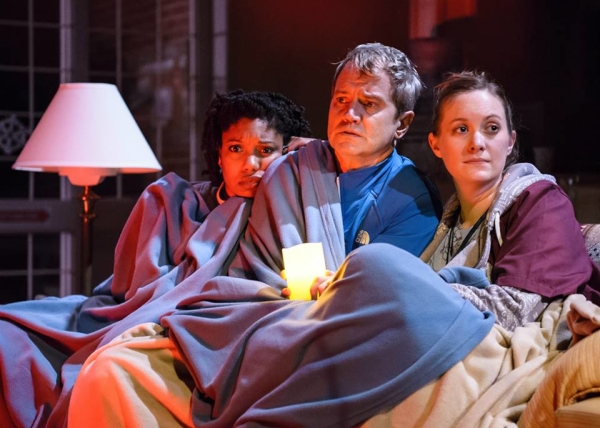Rest

(© Michael Courier)
If the monochrome weariness of depression manifested itself as a place, it would be the common room of a mid-level nursing home. The worn, nondescript carpet, the generic framed landscapes, the vacant-eyed people staring at a buzzing television, and above all, the knowledge that this is the last place most of them will live. It's an environment that's not even striking enough to be tragic.
It's also the kind of place that many people avoid like the plague — because the implications of the end of life are too frightening to contemplate for too long. But not for recently minted MacArthur Fellow Samuel D. Hunter. He sets Rest, now running at Chicago's Victory Gardens Theater, in the beige world of an Idaho nursing home on the cusp of being shuttered.
Everybody here is on the verge of checking out in one way or another. The staff is down to four nurses' aides Ginny (McKenzie Chinn) and Faye (Amanda Drinkall), an incompetent supervisor Jeremy (Steve Key), and Ken (Matt Farabee), a teenage cook who has taken the job at the suggestion of his pastor. The only patients left are husband and wife Etta (Mary Ann Thebus) and Gerald (William Norris), and Tom (Ernest Perry Jr.), a deceptively quiet fellow who spends his days gazing at whatever happens to buzz by on TV.
Gerald, once a scholar with an intensely gratifying, career-long passion for postmodern sacred choral works, is now no longer capable of hearing music. His dementia is constant and torturous (Norris' ravings about "faceless people" at the foot of the bed is chilling). "If he knew what he had turned into, he'd be so humiliated," Etta observes with a crispness that somehow augments the anguish embedded in the statement.
This is largely Etta's play, and Thebus instills her with both tart exasperation and generosity. Etta's kind, but she's had it with staffers who talk to her with the patronizing, smiley condescension of a kindergarten teacher addressing a room full of slow five-year-olds. Her best scenes are when she's dressing down the staff for infantilizing her.
Tom, on the other hand, keeps to himself, largely blending into the furniture until a show-stealing late scene wherein he schools absolutely everyone (including the audience) on the folly of underestimating and overlooking people who, like him, seem to blend into the furniture. Perry's got the best scene in the play, and he owns it. Playing a Born Again youth, Farabee could make the character an easy target, but he shades Ken nicely, making him more endearing and not nearly as insufferable as he initially seems.
The other characters aren't quite as richly drawn. Jeremy, in particular, provides a lot of comic relief, but his extreme sniveling and utter inability to supervise never ring true. As for the conflicts that play out between best friends Ginny and Faye, they seem a bit too neatly designed to bookend the end-of-life issues that dominate this play.
Directed by Joanie Schultz for its Chicago premiere, Rest has a plot that, in less experienced hands, could be predictable and strain credulity with key events. But Hunter's work depends more on the creation of a rich, unblinking view of a small, contained world that is populated by harsh yet quiet endings of lives, stability, and all that is known and familiar.
The production's true strength lies in Hunter's ability to wholly capture the combination of resignation and panic that envelops this Idaho facility after a blizzard takes over. From a power outage that plunges the place into darkness, to a patient who goes missing, this convergence of events is more melodramatic than likely — particularly in the final moments of the first act, which ends with a shocker that feels more like it belongs in a murder mystery than a thoughtful drama. Still, Hunter paints the sorrow surrounding his characters with aching effectiveness, making it the heartbeat of the production.
While issues with the plot and the characters mean Rest isn't as strong a play as Hunter and Schultz's last production, The Whale, there's no discounting Hunter's gift for etching memorable, affecting environments. Hopefully, that recent MacArthur "Genius" Grant means we'll see more of them in the future.











